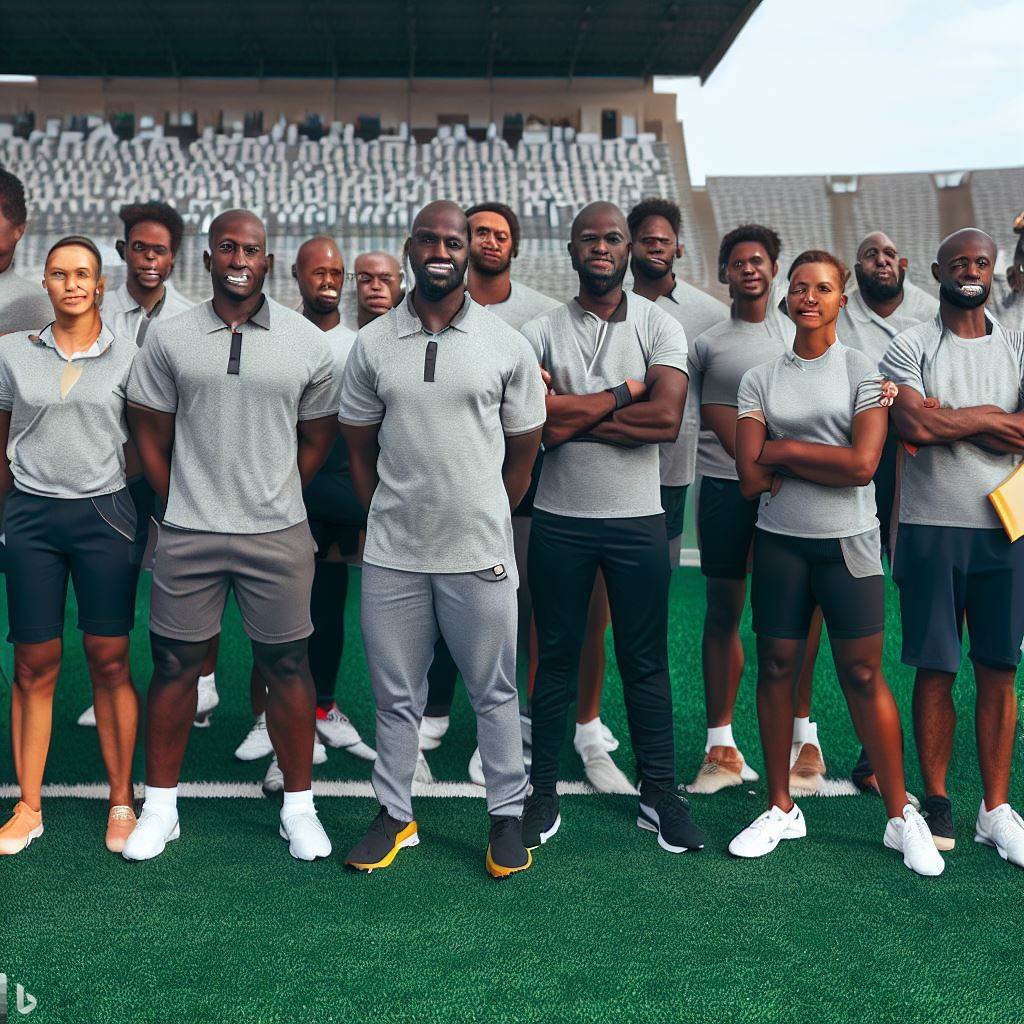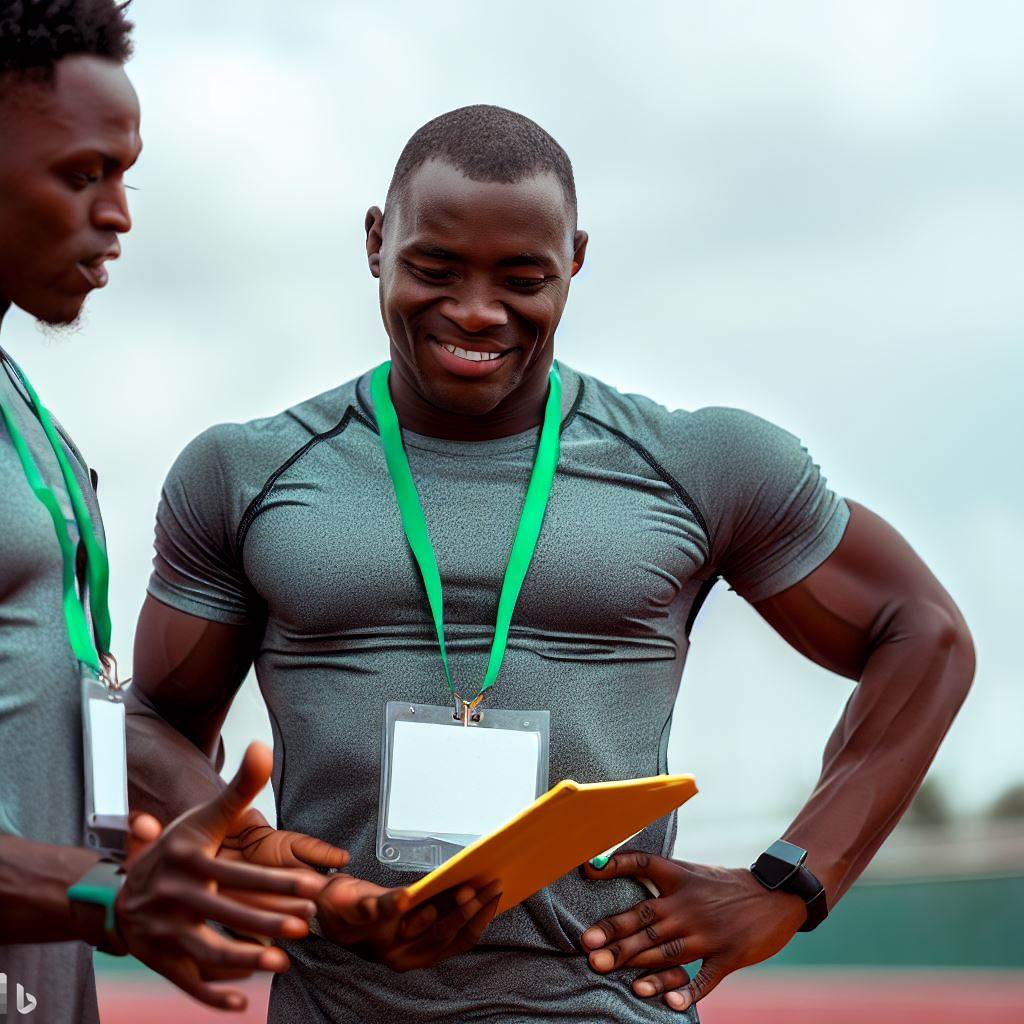Introduction
Assistant coaches play a crucial role in sports teams by providing support and enhancing players’ performance. However, in Nigeria, there is a lack of proper training programs for assistant coaches.
Brief overview of the importance of assistant coaches in sports
Assistant coaches are essential in sports as they assist the head coach in various aspects, including strategy development, player evaluation, and skill development. They provide valuable expertise and contribute to the success of the team.
Unfortunately, Nigeria faces a significant dearth of appropriate training programs for assistant coaches and due to the absence of government-funded initiatives and tailored training, assistant coaches face challenges.
Consequently, they struggle with modern techniques, sports science, and player development; this knowledge gap hampers coaching quality, impacting national and international sports progress
There is an urgent need for Nigerian sports authorities and relevant organizations to prioritize the establishment of training programs for assistant coaches.
These programs should cover various aspects, including tactical knowledge, injury prevention, leadership skills, and effective communication.
By investing in comprehensive training programs, Nigeria can unlock the full potential of its assistant coaches, enhancing the quality of coaching and ultimately improving the competitiveness of Nigerian sports teams globally.
It is crucial that the government and stakeholders work together to rectify this deficiency and provide assistant coaches with the necessary resources and opportunities to excel in their roles.
The role of assistant coaches
Training Programs for Assistant Coaches in Nigeria
In the world of sports, assistant coaches play a vital role in the success of a team. Their responsibilities are diverse and their importance in supporting head coaches and players cannot be underestimated. To ensure their effectiveness, training programs specifically designed for assistant coaches have become essential.
In Nigeria, recognizing the significance of assistant coaches, several training programs have been established. These programs aim to enhance their skills and knowledge, ultimately contributing to the overall growth and success of sports teams in the country.
The role of assistant coaches is multifaceted. They serve as a crucial link between the head coach and players. Their primary responsibility is to assist the head coach in various aspects of team management and performance.
By understanding the core responsibilities of assistant coaches, we can appreciate the necessity for training programs catered specifically to them.
Responsibilities of assistant coaches in sports teams
- Player Development: Assistant coaches play a key role in helping players reach their full potential. They work closely with individual players, providing guidance and support in skill development and technique improvement.
- Game Analysis: Assistant coaches are responsible for analyzing the performance of both the team and opponents. This includes studying game footage, identifying patterns, and suggesting strategies to the head coach to enhance the team’s performance.
- Practice Planning: Assistant coaches actively participate in designing and executing practice sessions. They focus on creating drills and exercises that target specific skills or address weaknesses identified during game analysis.
- Scouting: Assistant coaches often scout upcoming opponents to gather information that can contribute to the team’s game plan. They attend matches, study opponents’ playing style, and provide detailed reports to the head coach.
- Player Motivation: Assistant coaches have a crucial role in keeping the team motivated and focused. They provide positive reinforcement, offer support during challenging times, and help boost players’ confidence.
Importance of Assistant Coaches in Supporting Head Coaches and Players
- Assistant coaches ensure effective communication between head coach and players, conveying team goals and strategies efficiently.
- They offer individual attention, addressing players’ needs, fostering strong player-coach relationships amid large teams.
- Assistant coaches execute game plans, leveraging player insights to implement strategies effectively on the field.
- They maintain team stability, serving as reliable points of contact, fostering cohesion, and enhancing overall performance.
Nigeria’s training programs for assistant coaches are designed to enhance their effectiveness in fulfilling these responsibilities. These programs include:
- Technical Training: Assistant coaches receive specialized technical training to develop their understanding of the game and various coaching techniques.
- Leadership and Communication Skills: Training programs focus on improving assistant coaches’ leadership and effective communication skills to better connect with players and the head coach.
- Sport-Specific Knowledge: Assistant coaches undergo intensive training that focuses on the specific sport they are coaching. This equips them with in-depth knowledge required for optimal performance.
- Practical Experience: Training programs often involve practical sessions where assistant coaches gain hands-on experience under the guidance of experienced trainers and mentors.
In essence, assistant coaches are an integral part of sports teams, and their role in supporting head coaches and players cannot be overstated.
The establishment of training programs catering specifically to assistant coaches in Nigeria highlights the country’s commitment to developing a well-rounded and capable coaching staff.
By investing in their training and development, Nigeria aims to enhance the overall performance and success of sports teams at both national and international levels.
Read: Promoting Sportsmanship: Lessons from Nigerian Athletes
Current challenges faced by assistant coaches in Nigeria
Assistant coaches in Nigeria face a number of challenges that hinder their professional growth and development.
These challenges include a lack of formal training and education opportunities, limited access to resources and development programs, and inadequate recognition and support from sports authorities.
Lack of formal training and education opportunities
One of the major challenges assistant coaches in Nigeria face is the lack of formal training and education opportunities.
Many assistant coaches do not have a formal education in coaching or sports science, which hampers their ability to effectively coach and develop athletes.
Without proper training, assistant coaches may lack the necessary skills and knowledge to effectively analyze and improve athletes’ performance.
Overall, this can impact the overall quality of coaching and hinder the development of Nigerian athletes.
Limited access to resources and development programs
Another challenge faced by assistant coaches in Nigeria is limited access to resources and development programs.
In many cases, assistant coaches do not have access to modern training facilities, equipment, and technology that are crucial for athlete development.
Additionally, there is a lack of development programs and initiatives specifically tailored for assistant coaches. This limits their opportunities to enhance their coaching skills and stay updated with the latest trends and techniques in the field of sports coaching.
Inadequate recognition and support from sports authorities
Assistant coaches in Nigeria often face inadequate recognition and support from sports authorities, which can be demotivating and hinder their professional growth.
They may not receive the necessary financial support or recognition for their contributions to the development of athletes and sports in Nigeria.
The lack of support from sports authorities affects assistant coaches’ ability to create a positive impact and bring about positive changes in the sports ecosystem.
This can lead to a stagnant development of sports in Nigeria and hinder the country’s chances of success in international competitions.
To sum it up, assistant coaches in Nigeria face several challenges that hinder their professional growth and development.
These challenges include a lack of formal training and education opportunities, limited access to resources and development programs, and inadequate recognition and support from sports authorities.
It is crucial for sports authorities and relevant stakeholders to address these challenges and provide assistant coaches with the necessary support and opportunities to enhance their coaching skills and contribute to the development of Nigerian athletes and sports as a whole.
Importance of Training Programs for Assistant Coaches in Nigeria
Training programs for assistant coaches in Nigeria are crucial in enhancing coaching skills and knowledge. These programs provide valuable opportunities for aspiring coaches to develop their expertise and excel in their roles.
Below are the key reasons why training programs are important:
1. Enhance coaching skills and knowledge
- Training programs expose assistant coaches to the latest coaching methodologies and techniques.
- These programs provide coaches with the necessary tools and resources to improve their coaching abilities.
- By staying updated with current trends, coaches can better understand the ever-evolving nature of sports and adapt their strategies.
- Assistant coaches can learn from experienced mentors and acquire practical knowledge through hands-on training.
2. Improve understanding of sports psychology and player development
- Training programs offer insights into sports psychology, helping coaches understand the mental aspects of the game.
- Assistant coaches can learn techniques to motivate players, manage their emotions, and enhance their mental toughness.
- Understanding player development is crucial for coaches to identify and nurture talent.
- Training programs provide assistant coaches with the necessary knowledge to develop training plans tailored to individual player needs.
3. Promote effective communication and teamwork within coaching staff
- Training programs facilitate networking opportunities, allowing coaches to interact and learn from their peers.
- Coaches can exchange ideas, discuss strategies, and collaborate on improving their coaching methods.
- Effective communication is vital for the success of any coaching staff, and training programs emphasize its importance.
- Coaches learn how to effectively communicate with players, fellow coaches, and support staff, fostering a cohesive team environment.
In a nutshell, training programs for assistant coaches in Nigeria play a vital role in their professional development.
These programs improve coaching skills and knowledge, enhance understanding of sports psychology, and promote effective communication and teamwork.
By investing in training, assistant coaches can contribute to the growth and success of their teams and players.
Read: The Impact of Nigerian Athletes in International Sports
Examples of successful training programs for assistant coaches worldwide
When it comes to training programs for assistant coaches, there are several successful examples worldwide. These programs in countries like the United States, Germany, and Spain have proven to be highly effective in developing skilled and knowledgeable assistant coaches.
Let’s take a closer look at some renowned training programs and what sets them apart.
1. United States
- NCAA Coaches Academy: It focuses on strategic planning, team management, and leadership skills.
- US Soccer National B License: The curriculum emphasizes tactical knowledge and player development.
- Outcomes: Graduates gain a deep understanding of coaching methodology and player performance analysis.
2. Germany
- The German Football Association (DFB) Coaching Course: It covers technical, tactical, and psychological aspects.
- UEFA Pro License: This program focuses on coaching at the highest level and instills advanced tactical knowledge.
- Outcomes: Graduates develop a comprehensive coaching philosophy and gain exposure to elite football environments.
3. Spain
- RFEF Coaching Courses: These courses offer a progressive pathway from grassroots to elite coaching.
- Real Madrid Graduate School: It provides a combination of theoretical knowledge and practical experience.
- Outcomes: Graduates acquire a deep understanding of Spanish coaching methodology and gain access to valuable networking opportunities.
These training programs share certain commonalities in their structure, curriculum, and outcomes:
Structured Approach
All programs follow a well-defined structure that progresses from foundation courses to more advanced levels. This ensures a systematic development of coaching skills.
Comprehensive Curriculum
The curriculum of these programs covers a wide range of topics, including technical skills, tactical awareness, player psychology, and team management. It provides a well-rounded education for assistant coaches.
Emphasis on Practical Experience
Most programs incorporate practical components, such as on-field coaching sessions and internships. These hands-on experiences allow coaches to apply their knowledge in real-world scenarios.
Networking Opportunities
Successful training programs provide opportunities for coaches to interact with experienced professionals and build valuable networks within the coaching community. This fosters further learning and career development.
Overall, successful training programs for assistant coaches exist worldwide, and countries like the United States, Germany, and Spain have set high standards in this regard.
The structured approach, comprehensive curriculum, emphasis on practical experience, and networking opportunities make these programs highly effective.
Nigeria can take inspiration from these examples and develop its own top-notch training programs to nurture talented assistant coaches in the region.

Strategies for Implementing Training Programs for Assistant Coaches in Nigeria
Nigeria, being a country with immense potential in various sports, must prioritize the development of assistant coaches to ensure continued success.
Implementing effective training programs is crucial in equipping these coaches with the skills and knowledge necessary to assist their respective teams in achieving their goals.
Here are some proposed strategies for implementing training programs in Nigeria:
1. Collaboration with international sports organizations and coaches’ associations
A key strategy for improving training programs for assistant coaches in Nigeria is to collaborate with international sports organizations and coaches’ associations.
This collaboration can include sharing resources, expertise, and best practices.
Nigerian coaches can benefit greatly from exposure to different coaching styles and methods employed by successful coaches around the world.
By engaging with international sports organizations, Nigeria can tap into a wealth of knowledge and experience that will contribute greatly to the development of assistant coaches.
These collaborations can include hosting international training camps, inviting renowned coaches for workshops and seminars, and establishing exchange programs to facilitate cross-cultural learning.
2. Establishment of coaching academies and institutes in Nigeria
Additionally, a crucial approach is setting up coaching academies and institutes to institute assistant coach training in Nigeria.
These establishments can offer a systematic, extensive curriculum targeting diverse coaching tiers.
Within a coaching academy, courses can focus on distinct sports, encompassing coaching techniques, game strategies, sports psychology, and injury prevention.
Modules should also encompass leadership, communication, and mentorship aspects.
By providing a well-rounded education, these academies and institutes can produce highly qualified assistant coaches who can contribute effectively to their teams.
3. Creation of scholarships and funding opportunities
Financial constraints often prevent aspiring coaches from accessing quality training programs.
Hence, establishing scholarships and funding avenues becomes a crucial tactic in executing impactful training initiatives for Nigerian assistant coaches
Offering scholarships to passionate, underprivileged coaching talents. Nigeria strives for equity in program access, cultivating skilled assistant coaches for team triumph.
Beyond scholarships, partnerships with gov’t, sports foundations, and corporations can boost training quality, expanding reach and resources for Nigerian assistant coaches.
In a nutshell, Implementing effective training programs for assistant coaches in Nigeria is crucial for the development of sports in the country.
By collaborating with international sports organizations, establishing coaching academies and institutes, and creating scholarships and funding opportunities, Nigeria can ensure that assistant coaches receive the necessary training and support to excel in their roles.
These strategies will not only contribute to the growth and success of Nigerian sports but also empower assistant coaches to make a significant impact on their teams.
It is essential to invest in the development of coaching talent to create a sustainable sports ecosystem that fosters excellence and success.
Read: Role of Technology in Nigeria’s Sports Development
Benefits and Potential Impact of Training Programs on Assistant Coaches in Nigeria
Training programs for assistant coaches in Nigeria have the potential to bring numerous benefits and positively impact the coaching landscape in the country.
These initiatives aim to empower coaches with vital skills, enhancing Nigerian sports coaching quality and athletes’ performance and growth.
Empower and Equip Coaches with Necessary Skills and Knowledge
By participating in training programs, assistant coaches in Nigeria can acquire relevant and up-to-date skills and knowledge needed to excel in their roles.
These programs provide specialized training, focusing on areas such as coaching techniques, match analysis, sports psychology, and injury prevention.
As coaches gain these skills, they become better equipped to support and guide their athletes to success.
Training programs also expose coaches to various coaching methods and strategies from around the world. This exposure allows them to broaden their perspectives and adapt their coaching approaches according to different athletes’ needs and situations.
Consequently, assistant coaches can apply their newfound knowledge to enhance their coaching methods, leading to improved athlete performance and development.
Enhance the Overall Quality of Coaching in Nigerian Sports
A well-structured and comprehensive training program for assistant coaches can significantly raise the standard of coaching in Nigerian sports.
As coaches undergo training and gain valuable skills, their ability to deliver effective coaching sessions improves. This improvement translates into a higher quality of coaching throughout the country.
Coaches who have participated in training programs can act as mentors and share their knowledge with other assistant coaches. This knowledge-sharing culture positively impacts the coaching community, fostering an environment of continuous learning.
In turn, this leads to a ripple effect, as more coaches opt to participate in training programs, thereby further enhancing the overall coaching quality in Nigerian sports.
Improve the Performance and Development of Athletes
Training programs play a crucial role in the overall development and performance of athletes. By providing assistant coaches with specialized training, athletes benefit from improved coaching and guidance.
Coaches who possess up-to-date knowledge on athlete development, sports science, and periodization methods can create effective training plans to maximize athlete potential.
Through training programs, assistant coaches also learn how to address and prevent injuries. This knowledge ensures that athletes receive appropriate care and rehabilitation, minimizing the chances of long-term health issues.
Additionally, coaches trained in sports psychology can support athletes’ mental well-being, helping them manage pressure, set goals, and maintain focus during competitions.
The impact on athlete performance is significant, as well-trained assistant coaches can identify and nurture talent effectively. They can implement appropriate training techniques and provide constructive feedback to help athletes overcome weaknesses and exploit their strengths.
Ultimately, this leads to improved athlete performance and increased chances of success in national and international competitions.
Most importantly, training programs for assistant coaches in Nigeria offer numerous benefits and have the potential to make a lasting impact on Nigerian sports.
These programs empower coaches with the necessary skills and knowledge, enhance the overall coaching quality, and ultimately improve the performance and development of athletes.
It is crucial to support and invest in these training programs to create a strong foundation for the future success of Nigerian sports.
Read: Careers Behind the Scenes in Nigeria’s Sports Industry
Conclusion
Training programs for assistant coaches in Nigeria play a crucial role in the development of sports in the country.
These programs provide the necessary knowledge, skills, and strategies needed to effectively support head coaches and athletes.
It is important to acknowledge the existing gaps in the current training programs and take immediate action to address them.
This encompasses pinpointing improvement domains, including refining coaching techniques, sports psychology, and honing leadership aptitudes.
To ensure the effectiveness of these training programs, collaboration among relevant stakeholders is vital. This includes sports federations, government bodies, and educational institutions.
By working together, they can pool resources, share best practices, and create comprehensive training programs that cater to the specific needs of Nigerian assistant coaches.
Furthermore, it’s crucial to monitor and assess the impact of training programs, gauging success and pinpointing avenues for enhancement
This will ensure that the programs remain relevant and up-to-date with the changing demands of the sports industry.
In summary, enhancing coaches’ skills cultivates competitive sports culture. Therefore, immediate action and collaboration are essential for beneficial training.




